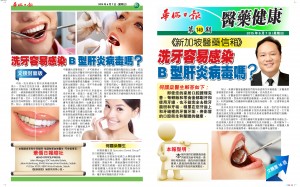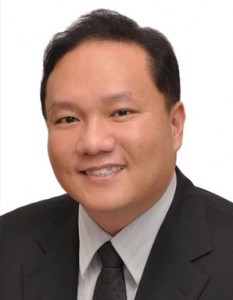 This article first appeared in Overseas Chinese Daily News (华侨日报) on 7 June 2015, in Sabah, Malaysia. For the benefit of those who missed the article, or who cannot access the publication in Chinese, we have summarized the content of the article below.
This article first appeared in Overseas Chinese Daily News (华侨日报) on 7 June 2015, in Sabah, Malaysia. For the benefit of those who missed the article, or who cannot access the publication in Chinese, we have summarized the content of the article below.
Q: Would I be infected with the Hepatitis B virus (HBV) if I visit the dentist for scaling and polishing (professional cleaning)?
A: Even if you adopt a complete home-based oral care routine, brushing after every meal (and even after snacking) and flossing once a day, you would not be able to fully remove the plaque and tartar found on your teeth. The accumulation of plaque and tartar in between and on your teeth would not only affect your oral health, but your overall health as well.
Therefore, the American Dental Association recommends visiting the dentist twice a year; the dentist will usually check your gums, teeth, oral tissues and carry out scaling and polishing.
Firstly, the dentist would use a stainless steel hand instrument to scale tartar (plaque that has hardened) on your teeth. Secondly, an ultrasonic dental instrument will be used to clean your teeth. Lastly, a dental instrument with a rotating head will be used to polish and remove stains caused by coffee, tea, red wine and other food.
It is very rare that one gets infected with HBV after visiting the dentist for scaling and polishing, but it is not entirely impossible.
We have to first understand the way HBV spreads. It is may be transmitted through blood, prolonged contact with a Hepatitis B carrier, sex with infected partner and during birth (from an infected mother to her baby).
In the process of scaling, the dental instrument may injure the patient’s gums, causing the gums to bleed. If the patient is suffering from Hepatitis B, the virus would be attached to the instrument. If the dentist uses the same dental instrument to clean another patient’s teeth, the virus may be transmitted. If the dentist is a HBV carrier, the chance of transmitting the virus to patients is also higher.
However, there is a very low possibility for HBV to be transmitted through scaling and polishing at the dentist. Dental instruments undergo rigorous sterilization and disinfection (processes like high pressure sterilization, soaking in disinfectant liquid etc.) after each patient to ensure that the instruments are sterile before the next use. The dentist and nurses are also required to change a new set of gloves after each patient. Moreover, the virus is unable to survive outside of the human body and will die within a short period of time after leaving the human body. Therefore, the transmission of HBV may only happen in dental clinics which are not registered or do not carry out proper sterilization procedures.
In Singapore, all dentists and dental clinics need to be registered with the Ministry of Health (MOH) before they are issued the license to operate. MOH is also very strict in hiring HBV carriers as medical and dental professionals. Hence, it is even less likely for one to be infected with HBV during a visit to the dentist.
In fact, HBV may also be transmitted in daily life through acts like sharing a toothbrush, razor blade or eyebrow shaver with a carrier. Therefore, besides selecting a regulated proper dental clinic, it is also important to be cautious when undergoing treatments that cause injuries to the skin. Our skin is nature’s defense and protects us from harmful external stimulation. Treatments such as facials, manicures/pedicures, and tattoo cause injury to our skin and allow our body to be susceptible to attack from viruses and bacteria.
Regular dental checkup plays an important role in maintaining good oral hygiene and a healthy smile. During your routine checkup, your dentist would be able to detect any oral problems and treat them as early as possible. In the early stages, treatment is relatively simple, reducing the probability of any inflammation. A beautiful smile would not only make you look younger, it can also increase your confidence.
In conclusion, as long as you are cautious in the selection of a dental clinic, the risk of being infected with HBV or similar types of virus is very low. There are definitely more benefits than drawbacks to visit the dentist twice a year.
About the Dental Specialist
Dr Ho Kok Sen
BDS (Singapore), MDS (Singapore), FRACDS (Australia), Pingat Kepujian,
FAM (Singapore)
Dr Ho Kok Sen is an Oral & Maxillofacial Surgeon with Specialist Dental Group®. Dr Ho is a mentor, lecturer and examiner to students in the Graduate Diploma in Dental Implantology course at the National University of Singapore. Dr Ho is a fellow of the Royal Australasian College of Dental Surgeons and the Academy of Medicine Singapore. He has a special interest in dental implants, jaw surgery, bone grafting and complex extractions.





